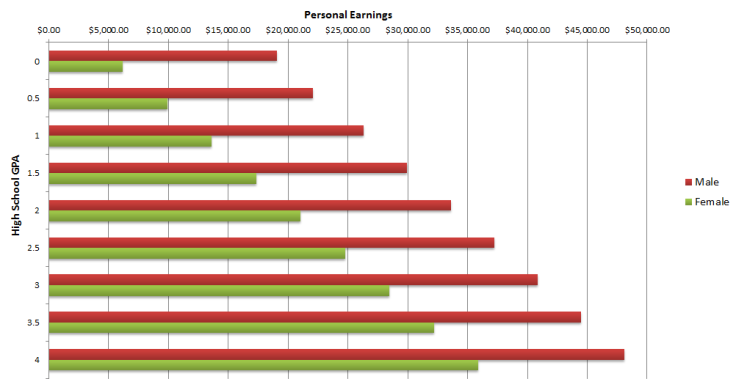High School GPA 'Strongly Predicts' Future Income, And Later Well-Being

A new economics study shows the importance of scholastic achievement during the formative high school years to later socioeconomic success in adulthood, itself a close predictor of health and well-being.
Health economics professor Michael T. French led a team at the University of Miami in crunching data from 10,000 young men and women between the ages of 24 and 34, a decade or so after this group had left high school. The researchers used multiple waves of data collected over the years from the National Longitudinal Survey of Adolescent Health.
"Conventional wisdom is that academic performance in high school is important for college admission, but this is the first study to clearly demonstrate the link between high school GPA and labor market earnings many years later," French said in a press statement.

Although past research had demonstrated an unquestionable link between post-secondary education and income, this study is the first to show that those formative years also matter. Among findings, French says that although girls tend to earn higher GPAs, men later outearn women in the workplace. Given an income disparity blamed often on sexism, the researchers produced separate analyses for men and women.
Yet some results held equally for both men and women. A one-point increase in GPA doubled the probability that an adolescent boy or girl would someday complete a college degree, from 21 percent to 42 percent. When examining race, French found that African-Americans actually attained higher educational levels than white students with identical high school GPAs and socioeconomic backgrounds, though overall black men achieved lower educations than their white counterparts.
"The results suggest that African-Americans with poor high school GPAs are less likely to graduate from high school and attend college, but once GPA and other factors are included in the models, they are actually more likely than other races to graduate from college and continue to graduate school," French says. "One possible explanation for this finding is that African-Americans with relatively high GPAs are more motivated and determined than whites to attend college and obtain an advanced degree."
French says the study might inform policymakers of the importance of high school achievement in not only collegiate success but long-term socioeconomic status, itself a close predictor of future health and well-being. Among other studies, a 2011 paper in the journal BMC Cardiovascular Disorders reports low socioeconomic status relating to high school education as an independent risk factor the development of heart disease.
French's study was published this month in Eastern Economic Journal.
Source: French, Michael T., Homer, Jenny F., Robins, Phillip K., et al. What you do in high school matters: High school GPA, educational attainment, and labor market earnings as a young adult. Eastern Economic Journal. 2014.



























